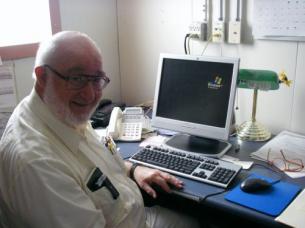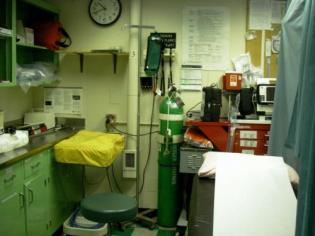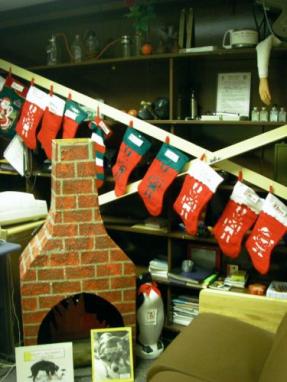December 7, 2007, Friday McMurdo Station, Antarctica
Special Edition to the Daily Journal: Meet the Station Doctor
This morning was the IPY broadcast and we were delayed from yesterday due to weather from going to Cape Evans. We have one last set of sediment samples to take but the penguins are the primary attraction. So today is the perfect chance to introduce you to the Chief Docter at McMurdo Station, Dr. Harry Owens.

Dr. Harry Owens
The story of Dr. Owen's.....
Dr. Owen's says he is based out of Oregon but that is just another place on the adventures of a lifetime. He was raised on a sheep ranch in Arizona with an aunt and uncle as well as in Los Angeles with his parents. In the 1960's he graduated form the St.Louis University School of Medicine and went to work for the United States Public Health Service in the division of Indian Health. He began his career in general medicine with the Eskimos north of the Arctic Circle. From 1967 to 1990 his base was in Alaska but he spent time working in far less developed regions of the world as well. In 1973, he workd on the ship Hope in northeastern Brazil and on the ship, Esperanza, on the Amazon river with indigenous populations His ability to speak Portuguese was cultivated during this experience. Working in Brazil took him to Guinea Bissau and Mozambique as the Peace Corps training director. Dr. Owens began working in the area of team building and stress management as a medical consultant but returned to working with indigenous populations in the Aleutian islands and then back to Tanzania to work with the Masai on the Serengeti. This is his second season in Antarctica. He arrived in late September on the WinFly and will remain here through February.
Challenges of Antarctic Medicine
The most common reason for seeking help at the hospital is to seek treatment for the chronic cases of the "crud" that new arrivals seem to catch relatively easily. The most common injuries that help is sought for are from strains and stress do to over use and the poor ability for the body to heal in cold conditions. Occasionally influenza will arrive with new personnel on the station resulting in isolation and quarrantine to stop the spread. In his two years on the station, there have been a few people medivaced for serious illness or injury but there have been no catastrophic injuries. Raytheon and NSF reinforce and strongly implement a safety training and injury prevention program to head off potential injuries. Field camps usually have a medic in the larger camps and can get people out if there is a serious problem. The most severe problem in the field camps include ankle sprains, back sprains, and bites by seals on occasion.
Facilities:
The hospital is located in a building that looks like a double wide trailer painted white with a penguin on the outside. It services 1,100 people at the height of the summer season as a clinic and a hospital. The National Science Foundation and Raytheon require that one has to be pretty healthy to come and that any on going chronic conditions are well managed with appropriate medications and do not interefere with routine daily work and field obligations. The lab work is mostly blood chemistries and biopsy diagnosis are sent to Christchurch as well as surgical and critical care and specialist needing patients. D. Owen's consulting facility is at University of Texas Medical Branch in Galveston.

Hospital Exam Room
If you would like to work in the medical department for the US Antarctic Program go to: USAP.gov for information about applying and research options.

Dr.'s office decorated for the holiday season
After our interview... Dr. Owen's gave me just the right combination of sinus medicines to finally get rid of my own case of chronic congestion and drainage. He did a great job cause I feel a thousand times better!

